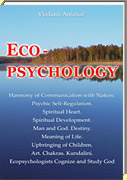New Ecopsychology
|

Published by ISBN: 978-1-8975-1016-2 © Antonov V.V., 2008 Love for GodFor those who move boldly and in the right direction, the spiritual Path is the Path of increasing bliss, joy, and happiness! But why do so few people walk this Path? And why are such a great number of people quite content with performing pseudo-religious acts like coloring Easter eggs, drinking heavily on holidays and ritual killing of animals and plants? Is it only a lack of intelligence that makes them do these substitutive actions, which are often nothing but crime in the face of God? Or maybe the reason is that they lack love for God? Love for God does not imply performing rites “just in case”: what if He really exists and will punish us! Love for God implies being lovingly attracted to Him: to cognizing Him and Merging with Him! It is like a sexual passion: those who are in love with Him miss Him and get saturated with bliss at times of rendezvous: successfully performed meditations. In order to love God like this, one has to know already what it is like to fall in love. For those who cannot love, God is unreachable. Jesus told about this: learn to love one another first — then you will be able to direct your already developed love towards God-the-Father. But one does not have to spend the entire incarnation learning hard and long the art of earthly love. One may speed up studying significantly by using special methods of developing the organ of love — the spiritual heart. It is also important to understand who God really is: fairy-tale characters that “pastors” of various degenerated religious schools propose to worship cannot inspire serious people for love, can they?! … God-the-Father can be cognized only if one lives a monastic life. But monasticism means not just wearing special clothes of certain color — black, white or orange… As well as not proudly assuming a new name — most often foreign. All of this is just childish games of grown-up people playing “religion”. True monasticism does not necessarily call for living in a monastery, as well as for giving up caring about the family or social service, or for a strict celibate or “mortification of the flesh” by rejecting elementary hygienic routines with wearing chains and enduring diseases. True monasticism is a state of being connected with the indriyas to God rather than to objects of the material plane. This is a result of soul’s being in love with God, which has been developed through meditative trainings. A monk — in the true meaning of this word, which God assigns to it — is a person who lives in a permanent alertness, in the state of “total war” with his or her vices and shortcomings. This spiritual warrior also fights for the well-being of his or her partners on the spiritual Path. An important attribute of a spiritual warrior is a cell: a room or a house where one can sleep and spend most of the time alone with God, also the possibility to seclude close to nature for meditative work. It is also very important to have the possibility to wash the body with soap every day. Maintaining an external cleanliness of the body promotes good health, freshness of feelings, and subtlety of emotions. It is also good to have a quartz lamp, especially if one lives in the northern latitudes — so that one can sunbathe all year round. Sunrays — not only “living”, but also artificial — confer good health on us; they are very favorable for the well-being of our bodies and souls. In addition to this in the life of a monk there should be spiritual books, friends-companions on the spiritual Path, and — what is the most important — God as the constantly present Teacher and Advisor, tender and caring, but inexorable to our deviations from the Path to Him, Universal Father and Mother. Criterion of the spiritual warrior’s success is the disappearance of egocentrism (which is manifested in susceptibility to the offence an in the desire to obtain something “for oneself”) and gradual increase of God-centeredness. The latter does not imply mere intellectual acknowledgement that there is God but a real feeling that He is everywhere, in everything, that He is Everything. Feeling of “I” disappears: one’s lower self — due to “concretion” with God with the indriyas — gradually dissolves in Him. This changes the ecological status of a person fundamentally, does it not? The Creator allows spiritual warriors, who are ardently in love with Him and who do not see the meaning of their lives other than Merging with Him in Love and helping others with it, to enter into His Abode, into Himself. Having placed ourselves there as the spiritual heart, we can for the first time really embrace with the arms of the consciousness our main Beloved. The subsequent consolidation of the Mergence with Him allows one to start acting from His Abode, perceiving oneself as a part of Him. This is the complete spiritual self-realization, the ultimate Liberation, the highest Nirvana, the completion of the personal evolution as a human being, the total cognition of God and of oneself and Mergence with Him into One. |